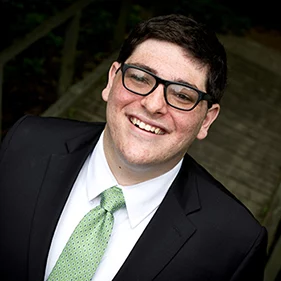Moving beyond walls

Growing up, I connected with my Judaism when I entered the synagogue, and I disconnected when I left.
My Judaism had four walls, a ceiling and an eternal light.
That changed when I spent a summer at Jewish sleepaway camp. Judaism was unrestricted, seeping out into everyday conversation and practice.
When I got back home, I began pushing myself to be more religiously aware. I craved an existence that meshed my day-to-day life with Jewish traditions. So eventually, when the opportunity arose to participate in a gap-year program in Israel after high school, I couldn’t say no.
In Israel, Judaism was unrestricted, seeping out into everyday conversation and practice. Restaurants were assumed to be kosher as a default. Cities shut down on Shabbat to give everyone a day of rest.
It was truly what I had wanted for so long. I was living a Jewish life and I loved it.
When I arrived stateside in May, reality slammed into me. Suddenly, I was the odd one out for wearing a kippah. Finding a kosher restaurant was impossible. The Jewish spark I had grown so accustomed to in Israel was simply not present at home.
As I started my collegiate education at Ohio University, just an hour or so from where I spent most of my childhood, I had low expectations for Jewish life on campus. I knew I wanted egalitarian, modern services, but I wasn’t sure there would be a place for that on campus. I felt a pit form in my stomach. Would I be alone on Friday nights?
I searched Ohio University Hillel, and a website with a phone number came up. I called and learned that services were being held that evening.
A wave of relief swept over me. I accepted that at the very least, I would be able to practice Judaism within the walls of Hillel.
Services were a magical experience. Everyone put forth their voice in song, filling the hall with the sound of our prayer. I remembered being a part of similar services in Israel. Everyone who was there wanted to be there.
After services, we sat down for a kosher meal, accompanied by boisterous laughter and meaningful conversations.
After my experience, I really wanted to be more involved than just a regular attendee. I began to connect with other Jewish students outside of the physical Hillel space. The defining factor of our friendship was Judaism.
That’s how I met Hadass. Our initial connection was our Judaism, and that has been a continuous thread throughout our friendship. We speak to each other in Hebrew, spend time learning and celebrate Shabbat together.
A few weeks into my freshman year, I approached our Hillel director about an internship, and luckily, the Israel engagement position was still available. Given my time in Israel, I was a perfect fit.
One of my responsibilities was to plan and lead Israel programs. Our main Israel event was creating an Israeli shuk experience, where students from various backgrounds could eat and hangout on campus. We planned to set up eight tents, including one with a falafel and pita stand and another with a mock Western Wall where students could write notes.
Because I had just returned from Israel, my team put me in charge of ensuring the tents were as accurate as possible. As we were in the final stages of preparing for the event, our campus closed because of the coronavirus pandemic.
We hope to reschedule the event for the fall, but nevertheless, the months-long planning process fostered a connection between my time in Israel and living on campus.
Now, I know Hillel is the place where I will find my friends. Friday night activities continue to be a wonderful break from the intense flurry of activities during the week. I’m able to reconnect with myself through prayer and with my friends over dinner.
My Judaism has once again seeped out of the synagogue to be a larger tenet in my life. And I have Hillel to thank for that.
Story written by Jacob Levin.